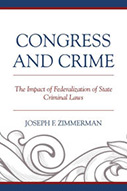Congress and Crime: The Impact of Federalization of State Criminal Laws

Author: Joseph F. Zimmerman
Publisher: Lanham, MD: Lexington Books, 2014. 165p.
Reviewer: Craig Hemmens | November 2015
As (hopefully) every high school student knows, the Constitution created a federal government of enumerated powers. Advocates of a strong federal government struggled, in the aftermath of the Revolution, to create a government that would be able to hold together the thirteen individual states in a meaningful union. Supporters of states’ rights feared the creation of a powerful centralized government, and sought to ensure that the states retained a variety of rights. The result was the creation of a unique federal system, where the states retain many rights, but where the federal government, by virtue of the Supremacy Clause of the Constitution, reigns supreme in certain areas. This division of power and the delegation of authority to the federal government in certain areas is generally referred to as preemption.
One area where the federal government — in particular Congress but in some circumstances also the Executive Branch — and the states, have overlapping jurisdiction is the administration of the criminal law. The states retain the right they had at common law to define what is a crime and to prosecute those who violate state laws. But the federal government also has the power, under the Police Power, to enforce criminal laws. For many years the federal government largely stayed out of the area of criminal law. Beginning in the early twentieth century, however, Congress began to pay more attention to the subject. The result has been the enactment of a plethora of federal legislation either (1) criminalizing a variety of actions that were already criminalized, in some fashion, by state law, and (2) encouraging states to assist in the criminalization of certain activities. In Congress and Crime: The Impact of Federalization of State Criminal Laws, Joseph Zimmerman examines what he terms “cooperative federalism,” or the process by which the federal government has interfered (both positively and negatively) with the enforcement of the criminal laws of the states and developed a separate body of federal criminal law.
The question Zimmermann asks is, has the process of cooperative federalism made for better, fairer, and more efficient administration of the criminal law? The answer is a definite maybe. He reviews the variety of ways Congress has worked to strengthen the enforcement of state criminal laws as well as Congress’s efforts to “federalize” what were heretofore considered state crimes. He provides an assessment of what has been done and offers some specific recommendations on how to address the problems created by the move to federalize state criminal laws. Zimmerman, a political science professor at the University at Albany, has written a number of books and articles on intergovernmental relations, and this book is a strong addition to his scholarly output.
While this volume is slim, it is packed with information. There are six chapters in all. Zimmerman begins, in Chapter One, by briefly introducing the notion of cooperative federalism and providing a summary of the constitutional convention and ratification of the constitution, and the debate between proponents of a strong federal government and those who wanted to retain strong, quasi-independent state governments. Congressional supremacy and the preemption doctrine are reviewed, as is the role of Congress in enforcing criminal laws—both its own and the states. In Chapter Two Zimmerman examines the different types of interstate cooperation regarding the enforcement of state criminal laws. In Chapter Three he discusses the role Congress has played in assisting states in enforcing state laws, using as case studies how the federal government has dealt with the illegal sale of cigarettes and alcohol. Chapter Four examines Congressional legislation federalizing state criminal statutes. Chapter Five examines the impact on the state and federal criminal justice systems (particularly the courts) of the federalization of state crimes. In Chapter Six, the final chapter, Zimmerman provides an assessment of cooperative federalism and offers some detailed recommendations for all the major players in the process.
Zimmerman knows his subject well, and he takes the reader through a variety of Congressional legislation, ranging from the Mann Act of 1910 (better known as the White Slave Traffic Act) through the Lindbergh Kidnapping act of 1934, to the large number of statutes criminalizing the sexual exploitation and/or abuse of children and women, many of which were enacted in the last two decades of the twentieth century. Many of these statutes are well known to criminal justice scholars, but the sheer number and range is still rather amazing to behold.
Zimmerman makes a strong case that the United States suffers from what he refers to as the “overfederalization” of crimes. The federal government, simply put, has become too involved in what was originally meant to be a state activity. The result is a tremendously overcrowded federal docket (which causes civil cases to be delayed, as criminal cases have priority, per the Speedy Trial Act) and a great deal of overlap in jurisdiction. There are many activities which are now both state and federal crimes. And while the courts have made it clear that the prohibition on double jeopardy does not apply when there are multiple prosecutions by multiple jurisdictions (in this case state and federal) based on the same act, basic questions of fairness do arise.
What to do about this state of affairs? Zimmerman provides a number of recommendations—twelve for Congress, four for the Executive Branch, and several more for the states. In general, he advocates for reducing the role of Congress and the federal courts in criminal law, and returning to the intent of the Founding Fathers. While some of his recommendations are fairly general (such as encouraging the President to play a leadership role in highlighting the problems associated with overfederalization of state crimes), many are very specific (such as including a five year “sunset clause” in each new statue federalizing a state crime). All are well-reasoned and appropriate responses to the problem—and Zimmerman makes a very strong case for his claim that overfederalization of state crimes has had a negative impact on the criminal justice system.
This book contains a tremendous amount of information in a small space. It should prove useful to criminal justice scholars, legal scholars and political scientists. I recommend it without reservation.
Craig Hemmens is Chair and Professor in the Department of Criminal Justice and Criminology at Washington State University.


